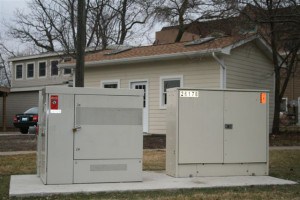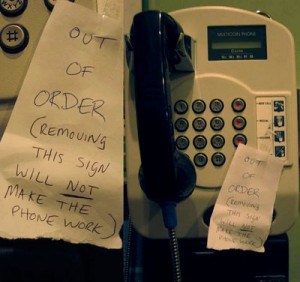You have to hand it to Wisconsin Gov. Scott Walker. He wants to push through his legislative agenda come hell or high water. After creating a national controversy about his battles with the state’s public unions, Walker and his Republican colleagues are in a hurry to ram through their laundry list of legislative initiatives before Wisconsin voters have a chance to potentially recall a number of them.
Among Gov. Walker’s favorites — a telecommunications deregulation bill ghost-written by AT&T. If such legislation seems familiar to you, it is. It’s largely the same bill written by and for telecommunications companies that withered in the Democratic-controlled legislature last year. Now the Republicans hold the majority, and they see measures to strip out rate protection for basic landline service, investigations of consumer complaints, and holding low-rated companies’ feet to the fire as “anti-business and anti-competitive.”
Somehow, bill proponents claim, all of this deregulation will inspire AT&T and other companies to wire rural Wisconsin for broadband service, which would be a remarkable feat considering they’ve not done so in other states where they’ve passed nearly-identical deregulation bills several years ago. In fact, the bill eliminates any state oversight of broadband matters period, end of story.
Perhaps AT&T’s goodwill will bring broadband to the rural masses. What are the chances? Not good, considering the proposed legislation also allows AT&T the right to abandon providing basic telephone service in the same rural areas still waiting for broadband. Your chances of getting DSL from AT&T are markedly diminished if the company decides to disconnect your phone line, permanently.
“What’s in it for the citizens of Wisconsin?” asked Rob Boelk, president of one Wisconsin chapter of the Communications Workers of America that represents AT&T workers. “If you want to give away the farm, what will you get in return?”
Why campaign contribution checks, of course.
AT&T and other telecommunications companies have donated heavily to legislators in the state, particularly those sponsoring their legislative wishlists. Walker has made serving the interests of AT&T and the Wisconsin State Telecommunications Association one of his top priorities this spring.
 AT&T is delighted. In fact, they are so confident in their friendship with Walker and the Republican-controlled legislature, they are willing to throw their usual deregulation allies overboard in the bill. Verizon and Sprint are fiercely opposing AT&T’s bill, despite promoting it in prior years. At issue are new provisions requiring wireless and VoIP providers to pay higher government fees and also pay access charges for using other companies’ broadband networks (AT&T’s) to complete calls.
AT&T is delighted. In fact, they are so confident in their friendship with Walker and the Republican-controlled legislature, they are willing to throw their usual deregulation allies overboard in the bill. Verizon and Sprint are fiercely opposing AT&T’s bill, despite promoting it in prior years. At issue are new provisions requiring wireless and VoIP providers to pay higher government fees and also pay access charges for using other companies’ broadband networks (AT&T’s) to complete calls.
At a recent hearing, telecom company executives told members of the state Senate’s Information Technology Committee Senate Bill 13‘s deregulation would bring competitive balance in the industry, wider broadband access and create tens of thousands of jobs.
They didn’t bring any evidence to back up those claims, but bill sponsor Rich Zipperer, (R-Pewaukee) was ready to deliver AT&T’s talking points anyway. He’s a helper.
“Today’s smart phone world is governed by rotary phone regulations,” Zipperer said. “We have to ensure our telecommunications infrastructure can keep up with market demands.”
Evidently that means upgrading wireless networks, something AT&T is preoccupied with these days judging from their television ads, while ignoring Wisconsin’s rural consumers.
In fact, when similar bills passed in other AT&T states, basic telephone service rates began increasing, sometimes repeatedly. AT&T wants to push customers into pre-packaged bundles of services, so most of the savings go to those who take all of their telecommunications business to AT&T. But if all you want (or can afford) is a basic telephone line, price increases are in your future.
Zipperer called copper wire landlines “ancient technology,” a relevant point if AT&T was delivering something better to every Wisconsin resident. They are not. Instead, while their landline network languishes in rural areas, the company is investing in U-verse upgrades in larger cities, setting up the potential for telecommunications have’s and have-no-longer’s.
Some of the accompanying documentation supporting the deregulation bill is also suspect.
We were particularly struck with broadband map data provided by bill proponents showing a bountiful supply of competitive choice for broadband service in Wisconsin. Ironically, their bill also bans the state from getting involved in broadband mapping in the future. Those who control the maps control the debate over broadband availability. As usual, provider-influenced maps promise service where none exists or comes with strings attached.
Providers equate wireless broadband as identical to DSL, fiber, and cable Internet service. Because of that, customers even in “one-bar” towns can “enjoy” wireless broadband from AT&T and Verizon (as long as they keep it under 2-5GB a month with AT&T or under 10GB on Verizon’s mobile broadband plans.) Sprint, which barely covers rural and suburban Wisconsin, is also considered a player. So is T-Mobile, despite the fact AT&T wants to buy it. For most of Wisconsin, the broadband reality is far different. AT&T is the dominant provider of DSL and U-verse service, Time Warner Cable delivers most of the cable broadband. In rural areas, a handful of Wireless ISPs deliver service to some areas, but many others have no access at all.
Robust competition? No. Will this bill change that? No.
Deregulation only enhances the trend of landline providers like AT&T allowing their aging landline networks to go to pot. Providing DSL or wireless broadband to rural Wisconsin requires the same return on investment with this bill as it does without, and these companies have refused to deliver either, using that reasoning, for years.
Despite common sense reality, the dollar-a-holler groups are working overtime with AT&T to push this bill. Take “Wired Wisconsin,” a group particularly ‘burdened’ with its corporate sponsors (namely AT&T). Wired Wisconsin is all for the deregulation bill, which they like to call “modernized telecom rules.” The group’s leader Thad Nation, is a lobbyist who has run several campaigns promoting AT&T’s agenda, including the ironically-named Midwest Consumers for Choice and Competition, TV4Us and Technology for Ohio’s Tomorrow, all creatures of AT&T.
Nation’s lobbying firm explains how it works:
Getting government officials or bodies to do what you want isn’t easy. Government is inherently a slow, bureaucratic entity. When you want elected or appointed officials to change policy, you need a comprehensive plan – and the resources, relationships and quick-thinking to implement that plan.
We come to you with decades of experience in advocacy, moving legislators and engaging state agency leaders to action. Let us help you build and drive an aggressive advocacy agenda.
It’s a tough job, and Nation can be glad he isn’t doing it alone. The Discovery Institute, which has turned pay-for-play research into an art form, was linked by Wired Wisconsin to “negate the myths and false assumptions” deregulation will bring. They quote from Connected Nation, another industry connected group. The only false assumption is that these people do this work for free and their results represent actual independent analysis.
Even if one were to believe AT&T’s claims, fact-checking them is just a few states away, in places like Arkansas, Kansas, or Texas. None of them are bastions of rural broadband. They weren’t before AT&T’s lobbying circus came to town and they still aren’t after they left.


 Subscribe
Subscribe














